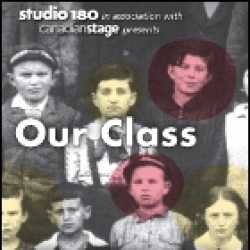 At the Berkeley Street Theatre, Downstairs. Written by Tadeusz Slobodzianek. English version by Ryan Craig. Directed by Joel Greenberg. Designed by John Thompson. Lighting by Kimberly Purtell. Sound by Michael Laird. Original score by Sophie Solomon. Starring: David Beazely, Jonathan Goad, Jessica Greenberg, Ryan Hollyman, Mark McGrinder, Kimwun Perehinec, Alex Poch-Goldin, Dylan Roberts, Michael Rubenfeld, Amy Rutherford.
At the Berkeley Street Theatre, Downstairs. Written by Tadeusz Slobodzianek. English version by Ryan Craig. Directed by Joel Greenberg. Designed by John Thompson. Lighting by Kimberly Purtell. Sound by Michael Laird. Original score by Sophie Solomon. Starring: David Beazely, Jonathan Goad, Jessica Greenberg, Ryan Hollyman, Mark McGrinder, Kimwun Perehinec, Alex Poch-Goldin, Dylan Roberts, Michael Rubenfeld, Amy Rutherford.
Produced by Studio 180.
This gripping, tough play by Tadeusz Slobodzianek uses a class of 10 school friends, to illuminate the sorry history of Poland from the 1920s to almost the present day. There are five Jewish children and five Polish in the class, and the play follows them from early public school to adulthood.
Along the way Poland is invaded first by the Soviets and then by the Nazis. Anti-Semitism rises with each invasion. Where once the children were all friends blending together, now the Jewish children are relegated to the back of the class and blamed for every social, economic and political problem (unemployment, lack of food etc.) Matters escalate until one day almost all 1600 Jewish inhabitants of the village are herded into a barn by their Polish neighbours, the barn set on fire and all inside perish.
At times in Slobodzianek’s play, it might be confusing who the actual invading army is at the time. One thing he makes clear though, the ‘enemies’ of the Jewish ‘children’ in the class, for the most part, are their Polish classmates.
Each classmate has his/her own story. From Abram, who leaves his whole family in Poland for America where he will become a rabbi; to Zygmunt, a graceful, charismatic bully who will lead his classmates into violence and murder; to feisty Rachelka who will be saved by a Polish classmate from that barn and marry him giving up her Jewish identity; to sweet Dora who will be raped and later killed, they are all individual and yet joined by that class.
Slobodzianek uses very few stage directions to explain or guide what the production should look like. It’s to director Joel Greenberg’s great credit that he has realized the emotional power of the play in his precise staging and sensitive direction without overwhelming it. A lot of violence is suggested. With movement and mimed action we can imagine the full force of the beating the Polish classmates give to a Jewish classmate, killing him, without actually seeing one blow land.
In another scene a classmate is raped by her former classmates—again, we don’t see her actually brutalized, but we can imagine it from her reactions. These scenes can be overwhelming to the point that the audience might turn away. Greenberg, in his delicate but gripping way, keeps the audience in the scene and in the play.
John Thompson’s set is simplicity itself: the playing area is a rectangular space with 10 chairs and two benches as props, the outline of the wooden roof of the barn suspended overhead.
The cast is exemplary. The cohesiveness is impressive. Their exuberant joy in the beginning when they are young and together, is in stark contrast later as they splinter off because of what they have done to each other.
While each actor is hugely accomplished in his/her part, a few are standouts. As Zygmunt, the bully leader who loves violence, Jonathan Goad moves like a graceful animal, is quietly persuasive, with a lethal smile and no conscience. As Dora, Amy Rutherford is almost ethereal in her generosity to her classmates, even to the man who raped her. And as Abram, Michael Rubenfeld is so moving talking about his family who perished in that barn. He gives the long list of names of his parents, his brothers, his uncles, aunts and cousins, getting angrier and angrier as the list of names gets longer. At the end of the play he gives the names of those he will leave behind when he passes away—his sons, their wives, his grandchildren and great-grandchildren, getting more and more joyful as the list goes on. I found that incredibly moving.
The place was packed for the performance I saw last night. And you could have heard a pin drop for all of it.
Our Class is a challenging play that is given a compelling, moving, soul-shaking production. It is theatre at its best and should not be missed.
Our Class plays at the Berkeley Street Theatre Downstairs until April 30, 2011.